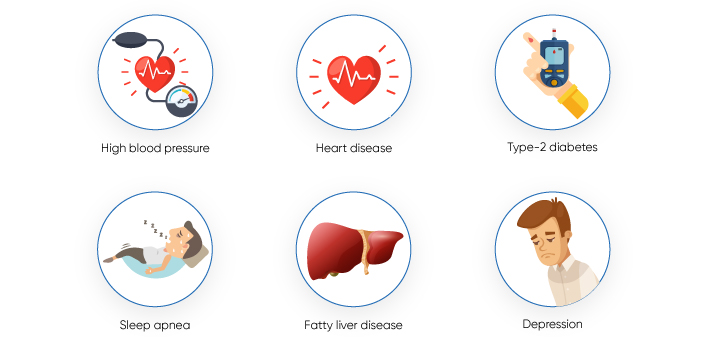Excess fat in the body interferes with the functioning of several organs and can lead to certain health conditions, such as:
- High blood pressure
- Heart disease
- Type-2 diabetes
- Sleep apnea
- Fatty liver disease
- Depression
- Correlation of obesity and hypertension


People with obesity have high amounts of fat, which gets deposited on the inner walls of the arteries. This causes the narrowing of the passage of arteries and reducing the blood flow. Hence, the heart pumps harder to supply blood to different parts of the body, thereby increasing the blood pressure.
Obesity occurs when the calorie intake is more than the calories burnt. It can occur due to genetic, behavioral, metabolic and hormonal influences on the body. The quantity of fat in the diet has a greater impact on weight gain when compared to calories alone. These fat calories are stored directly in the fat cells resulting in the weight gain, whereas carbohydrates, such as cereals, bread, fruits, vegetables, and proteins are converted to energy immediately after consumption.
The mechanism of obesity-related hypertension includes
Activation of the sympathetic nervous system (SNS)intake increases the levels of norepinephrine (a chemical present in the body). An increased level of norepinephrine narrows the blood vessel and increases the pressure of blood on the arterial wall. Thus, resulting in hypertension.
The renin-angiotensin system
system (RAS) is a hormone system that regulates blood pressure and fluid balance in the body. The effects of RAS in the body include higher blood volume, blood pressure, and sodium content. Angiotensinogen, which is derived from the fat cells is the primary driving component of RAS. Due to the excess production of angiotensinogen in obesity, the effects of RAS also increases including high blood pressure.
The amount of intra-abdominal and intra-vascular fat
abdominal fat has the greatest influence in developing hypertension. The excess abdominal fat will produce angiotensinogen, which involves the process of the renin-angiotensin system and increases the blood pressure. Intra-vascular fat is the fat deposition in the walls of the arteries. This fat deposition causes the blood vessels to become narrow, which makes the heart to pump harder and so the pressure of blood flow increases in the blood vessels.
vascular fat may sometimes completely block the blood vessel leading to the development of heart diseases.
High sodium levels in the blood due to increase in renal (kidney) reabsorption
Excess fat in the body interferes with the kidney function and causes sodium reabsorption. This reabsorption holds back a lot of fluid in the body and increases the blood volume. Due to the high blood volume, the force of blood in the blood vessel is increased.
 Obesity is a medical condition characterized by excess fat in the body. Obesity is measured in terms of body mass index (BMI), which is an estimate of body fat based on weight and height. If BMI is 18.5-24.9 kg /m², it is considered normal. If BMI is 25.0-29.9 kg /m², it is over-weight and BMI ≥30 kg /m² it is considered obesity.
Obesity is a medical condition characterized by excess fat in the body. Obesity is measured in terms of body mass index (BMI), which is an estimate of body fat based on weight and height. If BMI is 18.5-24.9 kg /m², it is considered normal. If BMI is 25.0-29.9 kg /m², it is over-weight and BMI ≥30 kg /m² it is considered obesity.




 Maintain calorie intake of 500–1,500 for men or 500–1,200 calories for women
Maintain calorie intake of 500–1,500 for men or 500–1,200 calories for women